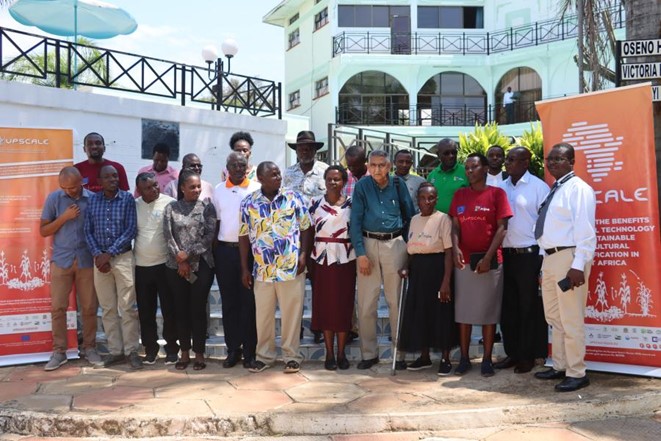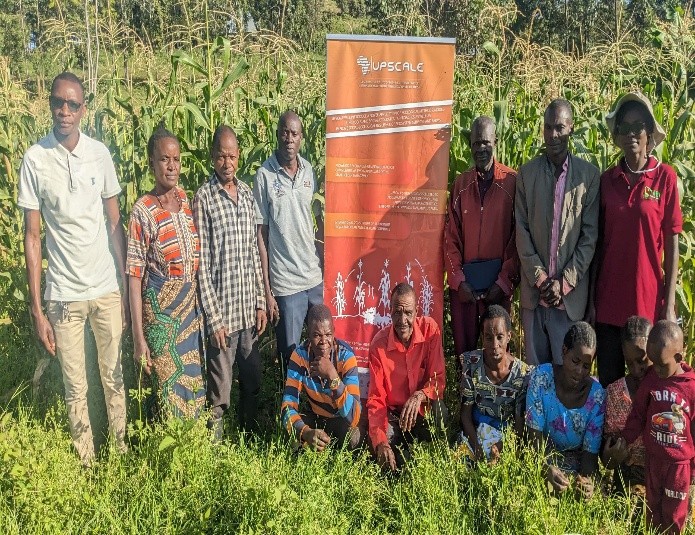Name of the event: The 3rd Kenya Annual National MAC Meeting
Date: The meeting took place on 07 December 2023
Venue: The meeting, jointly organized by icipe and MU, took place at Kisumu Hotel, Maseno University, situated in Kisumu City, Kenya. The selection of this venue was deliberate, driven by its proximity to the Push-Pull plots and the convenience it offered to all participating farmers. A total of twenty-eight participants, representing diverse organizations, actively took part in the meeting.
After the meeting, participants visited the Push-Pull plots located at Daraja Mbili and Maseno University. This was a moment to witness first-hand the implementation and impact of Push-Pull technology in these specific agricultural settings.
This event aimed to promote the benefits of Push-Pull and exchange ideas on other agroecology practices. Members of the Kenyan part of the UPSCALE team shared project progress in year two, monitored the progress of Multi-actor platforms formation and PPT products value chain analysis. This was a great opportunity to disclose the plan for the UPSCALE project activities for the next quarter.
Chief Guest Ms. Mary Ongadi AEO Kisumu County
“It is truly an honour to be here today as the guest at this event focusing on the push-pull farming system. Agriculture is the backbone of our society, and innovative approaches like the push-pull system play a crucial role in ensuring sustainable and resilient farming practices. The push-pull farming system is a testament to human ingenuity and our ability to find solutions to complex challenges. By integrating natural elements and leveraging the interplay between different crops and insect species, this system not only enhances agricultural productivity but also contributes to environmental conservation. The concept of “push” involves repelling harmful pests from crops, while the “pull” aspect involves attracting and trapping these pests away from the main crops. This integrated approach not only minimizes the need for chemical pesticides but also fosters a more balanced and harmonious ecosystem within our agricultural landscapes.
As we face the challenges of climate change, resource depletion, and a growing global population, it becomes imperative to adopt sustainable and efficient farming practices. The push-pull farming system is a shining example of how we can work with nature rather than against it. It reduces the environmental impact of farming, promotes biodiversity, and safeguards the health of both farmers and consumers. I advise the farmers, researchers, and organizations involved in the promotion and implementation of the push-pull farming system. Your dedication to finding innovative solutions that benefit both agriculture and the environment is truly commendable. As we move forward, let us continue to invest in research, education, and outreach programs to spread awareness about the push-pull system and other sustainable agricultural practices. By doing so, we can ensure a brighter and more resilient future for our farming communities and contribute to the global effort to build a sustainable and food-secure world. Thank you for having me here today, and I look forward to witnessing the positive impact of the push-pull farming system on our agricultural landscape.”
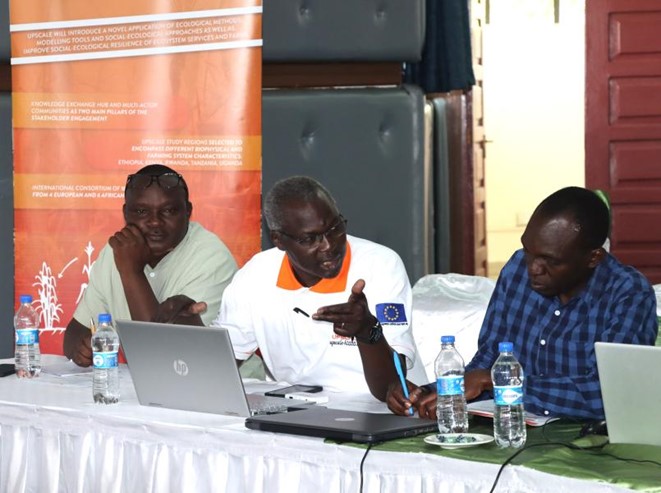
Participants during the workshop Dr. Benjamin Ombok , from Maseno University (Middle) giving his remarks
Dr. Ombok of Maseno University
“The adoption level of Push-Pull technology refers to the extent to which farmers have embraced and implemented this agricultural approach in their practices. The adaptation level assesses how well Push-Pull technology has been adjusted to local conditions and needs. The sustainability pathway of Push-Pull technology examines the long-term viability and ecological soundness of its implementation. Dissemination strategies of Push-Pull technology evaluate the effectiveness of methods used to spread awareness and knowledge about its benefits. Integration levels of Push-Pull technology measure the extent to which it has been incorporated into broader agricultural systems and practices.”
Dr.Aila of Maseno University
“MU has strategically targeted educational institutions to champion the adoption of PUSH-PULL farming technology. In Siaya County, MU has taken concrete steps by establishing Push-Pull Technology (PPT) plots in two schools, with a particular focus on expanding and upscaling existing initiatives. At St. Albert Simerro Secondary School, the PPT plot was expanded, engaging 43 students (21 girls and 22 boys) and 5 teachers. The cultivation included a diverse array of crops such as maize, cowpea, kales, desmodium, and Brachiaria. Similarly, at Tingare Mixed Secondary School, a new PPT plot was successfully established, involving the participation of 31 students and 4 teachers. The crops cultivated in this plot encompassed maize, cowpea, kale, and desmodium. MU’s proactive efforts in integrating PUSH-PULL technology into educational settings exemplify a commitment to practical, hands-on learning and the broader dissemination of sustainable agricultural practices.”
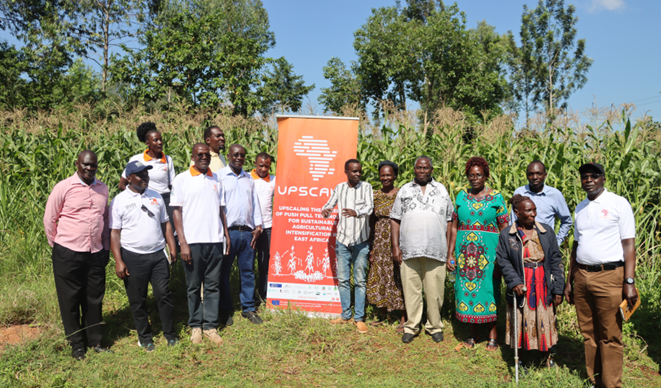
Participants in MAC workshop at Daraja Mbili in one of the lead farmer PPT plots on 7th of December 2023
In conclusion, the success of advancing sustainable farming systems through the implementation of Push-Pull Technology (PPT) hinges on the concerted efforts of fostering partnerships, utilizing strategic tools like calendars for information dissemination, promoting awareness through roadshows, advocating for the propagation of desmodium vines, systematic establishment of Brachiaria seedlings, and ensuring regular progress reporting within the Management Advisory Committee (MAC). By embracing these recommendations and collaborating with various stakeholders, the UPSCALE project will continue to have a high impact on sustainable agriculture.
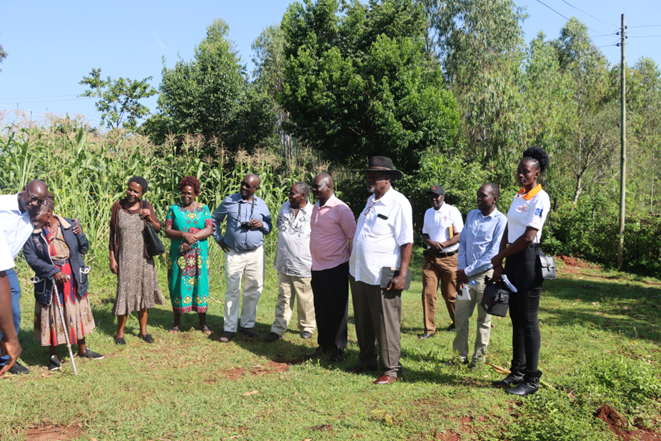
Participants in MAC workshop at Daraja Mbili in one of the lead farmer PPT plots on 7th of December 2023
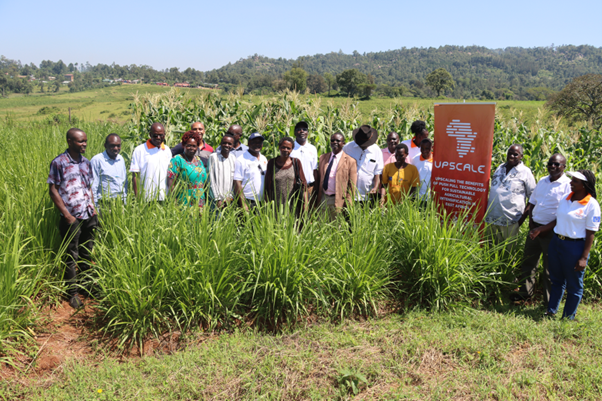
Participants in MAC workshop at MU PPT farm on 7th of December 2023

